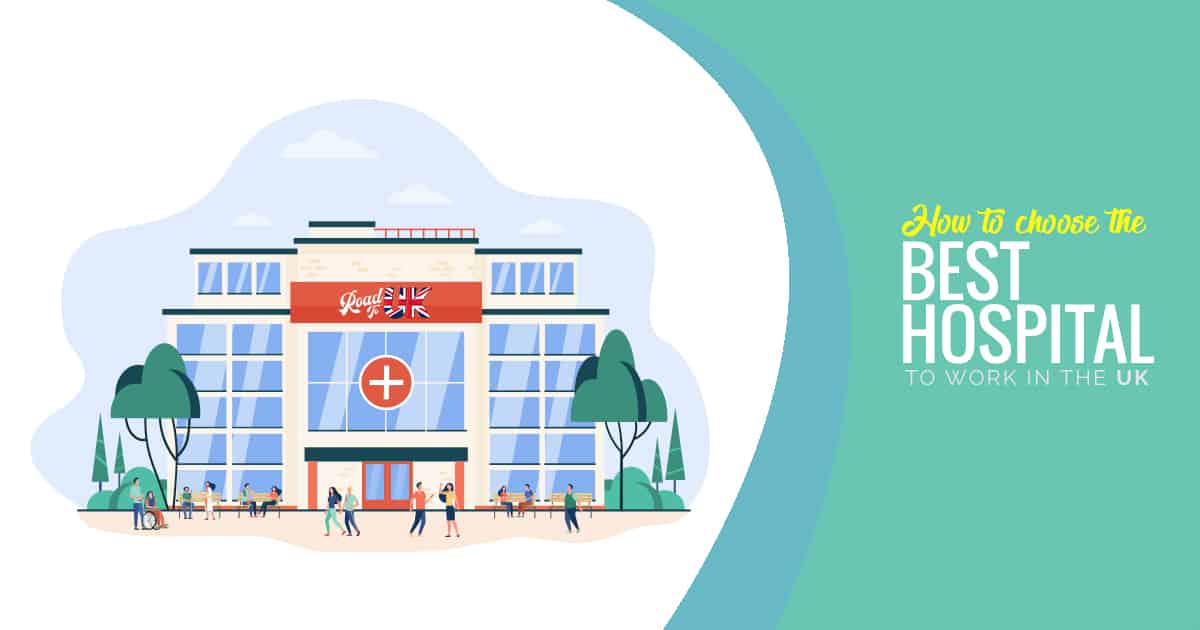How to choose the Best Hospital to work in the NHS

It may be that you’re starting your first job in the NHS, or that you’re moving to a new hospital, but it’s always a good idea to know what to look out for when you are starting out in a different area or Trust. Many of us resort to posting in different groups or scanning names in a file in the hopes of finding someone who can provide guidance, but more often than not, a contact is not found. So how to choose the best hospital in the NHS for you?
How can I find the best hospital in the NHS?
Luckily, keeping those methods of search in mind, there is another way to find out information about the hospital you’re interested in, from details about different departments, GMC ratings from junior doctors who’ve worked there, reviews lefts by various grades, resources you may need to start your journey, and relevant contact information.
Aside from this, there are important things you must consider before taking the steps towards accepting a job in a new setting. To begin:
Location of the Hospital
Now hear me out. I’m not saying that location is everything, and that it’s London or nothing, but location is very important in the sense that you need to be comfortable with where you are. Some things to keep in consideration are proximity to an international airport, availability of certain groceries, distance from major cities, cost of living, and whether or not you know anyone.
These aren’t deal breakers, but in my experience, when most people start feeling homesick or generally overwhelmed with their condition in their first few months in the NHS, it’s from one of these things.
For a quick snapshot- the cost of living in London is 55% more expensive than in Manchester, 64% more than Liverpool, 167% more than in Dhaka, 210% more than Delhi, and 251% more than Islamabad. [Source: expatistan.com]
You want to find a place that lets you have an outlet to do things on your off days so you aren’t always in and out of the hospital. If you’re also not too keen on snow and frigid temperatures, you’ll need to find a place that at least gets a little sun more often than not. The UK affords you the ability to choose different climates in the sense that you can pick to live in lush greenery, beach side, smack dab in the city, or tucked away near the mountains.

Job description of the post
Aside from location of the hospital, it is prudent to ensure that the job you take is what you want. If it is a rotational post, make certain it has the departments you wish to work in. Do not just blindly apply for a variety of jobs when you have a specific job in mind because you are concerned you won’t get a callback. It will only make it that much harder for you to adjust to your new environment.
If you’re unsure about which field you’d like to start in, I would suggest looking for posts in emergency medicine as it allows for exposure in a variety of specialties, which may help you come to a decision in the long run (or you may end up loving emergency medicine!).
You can get a feel of what to expect in A&E from our post on Working in A&E. Here is some info about working in acute medicine.
Whatever you choose to do, just keep in mind that it is a good idea to get a complete and thorough understanding of the job you will be doing and what is expected of you. If possible, try to do your interviews in person as it will allow you to gauge your surroundings as well as the setting in which you’ll be working.
Your (and your family’s) accommodation
Many hospitals have onsite accommodation which you can easily avail if there is a vacancy, but a good majority do not allow for more than single accommodation or for children. In that case, you should first look into whether or not there is a suitable option for external accommodation. Again it’s important to see the place you wish to stay in before moving in. This can be difficult if you’re coming directly from abroad, so if possible, looking into short stay options or an AirBnB for some time until an appropriate option arises.
Questions to ask HR of the hospital
One thing that needs to be kept in mind is that emailing is the best form of communication with your HR. Also remember that you don’t just HAVE to take what they are offering. You will be working for them, so you have some degree of negotiation you can wield.
Let’s move onto what queries to ask. Please remember that there are many questions to ask, so try not to be rude and ask a plethora of questions right away when they sent you a conditional offer of appointment. Be courteous, be polite, and ask your queries gradually in a conversational manner.
Politeness is to human nature what warmth is to wax.
Skilled worker visa application related queries
- Will the trust tick ‘Yes’ for maintenance in the CoS? If your trust is an A-rated Sponsor, it is likely they will tick Y for maintenance for you and your dependents. If they don’t, remember that you will have to provide proof of £945 for 90 days for yourself and £630 for each of your dependents as maintenance.
- The duration of the CoS: Aim to get a 3 year CoS. You will have to pay for a TIER 2 visa up to 3 years anyway, even if your CoS is for 6 months. So, by getting a CoS for as much time as possible even if your contract is for 6 months, gives you less of a headache when you start your job. Remember that you can’t negotiate if it’s not in their policy, but asking never hurts.
- The start date and end date in the CoS: Clarify with your HR that your visa application may take time and that’s why you need a start date that gives you some leeway. For example, if they are applying for your CoS in May, you can ask them to put the start date from the beginning to mid July, which gives you the month of June to apply for the visa and prepare.
- What papers do they need for your CoS application? Some trusts have a form for you to fill up for your CoS application. Expediting the process of receiving your CoS should be your primary target after accepting a job.
Payroll related queries
- Basic and Gross pay: A proper clarification of your basic and gross pay (after adding the enhancements) is necessary before accepting an offer. Please read more about that in A Doctor’s pay in the UK for further knowledge and clarification about your pay.
- Negotiation: Some Trusts take your previous experience into account when setting up your pay. They also might give you a form to fill up and send them for consideration.
Relocation related queries
- Hospital accommodation: A very important query. For a new starter, staying in the hospital accommodation is the best thing that can happen. Ask the HR, they will help you get into contact with someone who can manage it for you.
- How much you can claim for your relocation? Different Trusts have different policies, so a cursory question doesn’t hurt. If they are covering enough, you can opt for taking a comfortable cab from the airport instead of lugging your bags by train/bus.
Post-graduate Medical Education related queries
- Access to e-portfolios: If you have not got your foundation competencies signed, you can get that signed while you are working as a junior doctor (be it FY2 or CT1 level). Access to e-portfolio will also make your future core-training application better and organized. Horus e-portfolio is the one that is used by the doctors who haven’t got their foundation competencies signed.
- Access to teaching sessions, seminars and courses: Ask about your degree of involvement.
How to choose the best hospital to work in the NHS
Let’s summarize about how you should find out which hospital in the NHS is the best for you to start working. The following list is according to my priority.
Chances to progress your career
If you are choosing the hospital in the NHS for a non-training job, then definitely you should look forward to what this trust/employer is going to provide you to make progress your career. The chance of having access to e-portfolio, PG medical education, study budget also plays a role to choose a particular job.
Availability of accommodation
If you have to drive a big distance or have to take longer public transport, your big part of the day then goes to travelling in and out of the work. Finishing long-day or night shifts can be more excruciating than the shift itself. So availability of places to live nearby the hospital is also a point in my list.
Choosing a good location
There are some areas in the UK which are notoriously known to be deprived. I would personally stay away from those cities, as the hospital you work at is not everything. You need to be able to unwind over the weekends, you need to feel that you have traded into a good quality of life by making the decision of moving to the UK.
Finding the right job
You can work in the top-most hospital in the UK but may not like the specialty you are working in. So, if your heart doesn’t want to be a surgeon, then don’t force it to work in the surgery department in “well” located hospital.
Frequently Asked Questions
Which UK hospital has the best training?
Training in the UK (unlike in the USA) is not provided or regulated by the hospital. There are deaneries which mandate how the training should proceed, and regulate it across the UK.
Can I join a private hospital instead of NHS in the UK?
Yes you can. These jobs are often via private recruitment, and not through the NHS jobs website. They may also not be as regulated or supported as compared to the NHS as these posts tend to be more service orientated rather than training bound.
Does Scotland cover the NHS?
Yes. While England, Wales, Scotland, and Northern Ireland may have different names for the services they provide, it all falls under the umbrella of the NHS.
Who has the best healthcare system in the world?
That question is fairly subjective. Have a look at our article on why we enjoy working in the NHS for an in-depth response.
Which hospital is the biggest in the UK?
If you are just looking at the number of beds, Manchester Royal Infirmary tops out at 1,700+. After that, you have Queen Elizabeth Hospital in Glasgow, and third goes to Queens Medical Centre in Nottingham.
Now you’re set! You have all the tools in front of you to make a informed decision regarding which is the best hospital for you (and your family!) to work in the NHS in the long run. Now the only thing left to be concerned about is what to expect on your first day!

